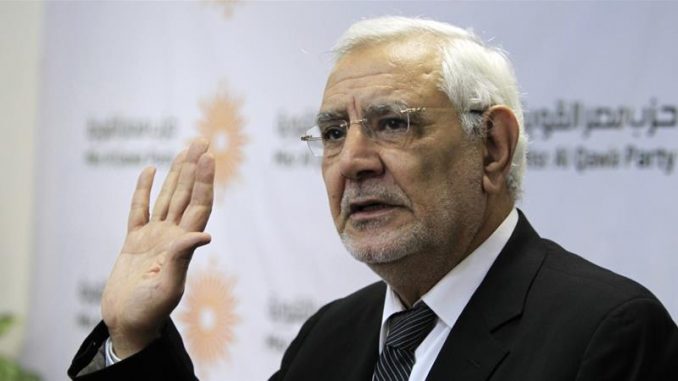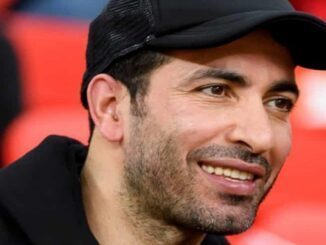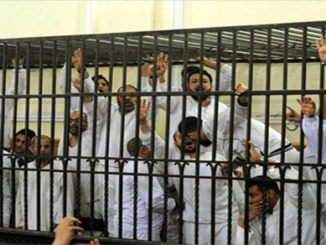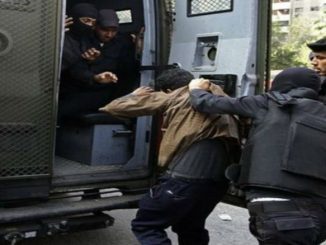
The Egyptian administrative court declines request of leader of the Strong Egypt Party Dr. Abdel Moneim Aboul Fotouh to end his solitary confinement
Egypt’s Administrative Court has rejected for the second time a request by former presidential candidate and leader of the Strong Egypt Party Dr. Abdel Moneim Aboul Fotouh to end his solitary confinement.
Dr. Aboul Fotouh’s petition to end his solitary confinement included requests to enable him to enjoy his “legal and constitutional rights, including reading newspapers, reading books, physical exercise, performing Friday prayer at the prison mosque, speaking on the telephone, sending and receiving letters, having physiotherapy and having a small fridge to preserve his medicines.”
All of Aboul Fotouh’s requests relate to rights guaranteed by the laws and regulations governing prisons in Egypt.
Despite the legal maximum period that a prisoner can be held in solitary being eight months in total, he has spent more than two years in solitary confinement.
Last March, Dr. Abdel Moneim Aboul-Fotouh was subjected to a “barbaric” assault by prison guards in his cell at the notorious Tora prison complex, according to his family.
According to the family’s post on Facebook, Dr. Abdel Moneim Aboul-Fotouh, leader of the Strong Egypt Party, was attacked by guards after trying to file a complaint about denial of his family visits in prison.
Aboul-Fotouh, who ran for president in 2012, was reportedly preparing to file an official complaint with the public prosecutor.
As a result of the reported assault, Aboul-Fotouh, who has had multiple heart attacks and other chronic health issues while in detention, had an episode of angina, according to the statement. Aboul-Fotouh has long complained of medical negligence since his arrest and detention in February 2018, a practice that has been widely documented in Egyptian prisons by human rights groups.
Aboul-Fotouh had started a protest on 29 January this year, whereby he began refusing to see visitors. The protest stemmed from what the family’s statement said were “exceptional” prison conditions where “restrictions were imposed on (Aboul-Fotouh) without justification”.
The reported assault took place after the prisoner requested a meeting with the prison warden in order to file a complaint explaining why he was refusing to receive visitors, claimed his family.
In July, Aboul-Fotouh survived a “severe heart attack” in prison, according to his son. He claimed that the guard who was outside the cell “witnessed his suffering and as he tried to seek help for hours, to no avail”.
The politician’s family has repeatedly accused authorities of subjecting him to a “slow death” due to medical negligence and the tough conditions of his solitary confinement.
“After more than three years and five months in pretrial detention, in solitary confinement, in complete isolation, and a continuous deterioration in his health that threatens his life at every moment, when will he return home?” Aboul-Fotouh’s son said.
Aboul-Fotouh is one of at least 60,000 political prisoners estimated to have been jailed since Egyptian President Abdel Fattah el-Sisi took power in a coup in 2013.
Sisi overthrew Mohamed Morsi, the country’s first democratically elected president, who was affiliated to the Muslim Brotherhood.
Several Brotherhood leaders have died in custody in recent years, including Morsi and former MP Essam el-Erian.
Rights groups have said their deaths were most likely due to medical negligence and poor conditions in jails.
According to the Geneva-based Committee for Justice, since Sisi’s coup at least 731 people have died in custody due to denial of healthcare.
Abdel Moneim Aboul Fotouh was arrested in February 2018 with six other Strong Party members and accused of leading an outlawed group, harming national interests and spreading false news inside Egypt and abroad.
The Cairo Criminal Court placed him on a terror list for five years, banned from travelling and froze his assets.
Aboul Fotouh has denied all charges against him and said that he ceased to be a member of the Muslim Brotherhood in 2000.
Aboul Fotouh ran in the 2012 presidential elections and has previously criticized the Egyptian government.
In media interviews he called for a boycott of the presidential elections and criticized the atmosphere of fear around the electoral process.
In July last year his son announced that he had suffered a heart attack in jail and that prison guards just watched as he cried for help from his cell in Tora Prison.
Abdoul Fotouh, who is also the former Secretary-General of the Arab Doctors Union, has been denied medical care throughout his detention, including for spinal pain.
The former presidential candidate has been held in pretrial detention for three and a half years though under Egyptian law detainees can be held on remand for a maximum of two years. He appeared in court for the first time in November 2021.
In January this year the UN expressed “deep concern” about Aboul Fotouh’s life-threatening health condition and the conditions of his detention, including solitary confinement and no adequate access to sunlight or fresh air.
Although Aboul Fotouh was arrested in 2018, however, his interrogation only started in February 2020.



